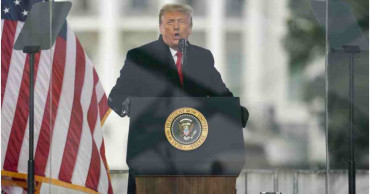volatile
Forex market may be more volatile unless reforms are done
Recent fall in inward remittances, earnings from exports, and a looming global recession are all signalling that the external account crisis will be prolonged further, they say.
They projected that around $20 to $25 billion worth of foreign currency has been consumed in different forms by informal transactions, which are not recorded at any official level. Because of this, the depth of the foreign exchange crisis is remaining less understood and unaddressed. they say.
Dr Debapriya Bhattacharya, a macro-economist and a Distinguished Fellow at the Centre for Policy Dialogue (CPD), told UNB that to understand the magnitude of the problem it is important to see how it works or does not work in a complex market of foreign currency.
“We should take note of it that a big volume of the foreign currency, I mean, US dollar is used for financing consumption of goods and services overseas as well as third-party cross-border payment for smuggled items such as gold and cattle,” he said.
“Moreover, illicit financial flow is also taking place from over-invoicing in the private sector transactions and public sector projects,” he said.
In line with these unrecorded and informal, and often illicit foreign exchange transactions, the monetary policy in general and foreign exchange regulation, in particular, have limited institutional effectiveness with regard to external balance management, he pointed out.
Debapriya said Bangladesh is now a $500 billion economy, and managing such an emerging macro-economy with a fast-changing global scenario demands institutional reforms to swiftly oversee the forex market.
As the government negotiates balance of payment support from the International Monetary Fund (MF) such reforms addressing the informal transactions of foreign currency will become a major concern to deal with, he said.
Read: Market-based foreign exchange rate may be introduced soon: Finance Minister
This will also need complementary trade and investment policy reforms, he added.
Though the economy is expanding, the institutional reforms and capacity is not being enhanced accordingly, he said.
He said that the World Bank has rightly predicted that unless massive reforms are done Bangladesh’s economic growth would slip in the face of impact of global trade competition.
Dr Mohammad Abdur Razzaque, an economist and specialist in applied international trade, told UNB that falling remittances by 25 percent and export falling by over 6 percent is “a warning for Bangladesh’s forex market.”
He said Bangladesh will get an advantage slightly from the falling prices of fuel, edible oil and other commodities in the global market due to a recession.
The use of forex for import payments will be decreased at the same time, affecting Bangladesh’s export income, and the trade deficit will also widen then, he said.
In the first two months (July-August) of the current fiscal year 2022-23, the trade deficit stood at $4.55billion. As the export income is less than the import spending, this large trade deficit appeared at the beginning of the fiscal year.
At the same time, the deficit in the current account balance of foreign transactions also exceeded by $1.5 billion.
Also read: Foreign exchange rate stable after Bangladesh Bank tightens spending
According to Bangladesh Bank, in the first two months (July-August) of the current fiscal year, goods worth $12.69 billion have been imported against exports worth $8.13 billion. This has created a trade deficit of $4.55 billion.
The deficit volume will widen more as the export in last month (September) fell by 6 percent.
Bangladesh Bank is selling US dollars from the reserves in continuation of the last fiscal year to bring 'stability' to the forex market. The central bank sold $2.57 billion from reserves in two months (July-August) and of the current FY 2022-23.
The central bank sold $7.67 billion from reserves in the FY 2021-22 to stabilize the forex market. Bangladesh had never sold so many dollars from the reserve in a single fiscal year earlier. However, in the previous financial year (2020-21), Bangladesh Bank bought a record $8 billion to keep the forex market stable during the falling trend of imports during the Covid-19 pandemic.
3 years ago
Trump painted in testimony as volatile, angry president
When President Donald Trump learned his attorney general had publicly rejected his election fraud claims, he heaved his lunch at the wall with such force that the porcelain plate shattered and ketchup streamed down.
On the morning of Jan. 6, 2021, consumed by crowd size concerns, he directed staff in profane terms to remove metal detectors he thought would slow down supporters who’d amassed in Washington for a speech. Never mind that some were armed — they weren’t there to hurt him, he said.
And later that day, irate at being driven back to the White House instead of the Capitol, Trump uttered words to the effect of, “I am the f’ing president. Take me up to the Capitol now” and grabbed at the steering wheel of the presidential vehicle.
Trump’s volcanic temper has been the stuff of lore throughout his career in business, but during his presidency it has rarely been described with such evocative detail as in the testimony Tuesday of Cassidy Hutchinson, a junior White House staffer whose proximity to the-then president and top aides that day gave her a remarkably close view.
Hutchinson offered previously unknown details about the extent of Trump’s rage in his final weeks of office, his awareness that some supporters had brought weapons with them and his ambivalence as rioters later laid siege to the Capitol.
READ: 51 migrants die after trailer abandoned in San Antonio heat
The testimony came as the Justice Department expands its investigation into the insurrection and deepened, but did not resolve, questions about whether Trump himself could face criminal charges for his conduct. Though Attorney General Merrick Garland has given no hint about whether his department will bring a criminal case against Trump, some legal experts said Hutchinson’s testimony could give prosecutors additional facts to pursue.
Potentially problematic for Trump could be his urging on the morning of Jan. 6, 2021 to take down metal-detecting magnetometers that he thought were slow down supporters who’d gathered for a rally near the White House.
Upset that some in the crowd might not get to see him, Trump, according to Hutchinson, said words to the effect of, “I don’t care that they have weapons. They’re not here to hurt me. Take the f’ing mags away. Let my people in. They can march to the Capitol from here.” “Mags” refers to magnetometers.
“A congressional hearing is not a court of law, but if this isn’t powerful evidence that he wasn’t just aware of the possibility of violence on the 6th but that he actively wanted to encourage it, I’m not sure what is,” said Stephen Vladeck, a University of Texas law professor.
Whatever any outcome related to a criminal proceeding, the disclosures come as Trump is laying the groundwork for another presidential run in 2024. Aides have been debating the merits of when he should announce his intentions.
Looking to blunt negative publicity surrounding her testimony, Trump issued statements Tuesday on his social media platform calling her accounts of his behavior “fake” and denying that he had requested “that we make rooms for people with guns to watch my speech.”
Trump is well-practiced at marginalizing his critics and accusers, but Hutchinson’s well-calibrated testimony will test that power anew.
Tuesday’s hearing, the sixth by the House committee investigating the insurrection, was accompanied by suspense even before it began. It was hastily announced on Monday, but the committee did not reveal the identity of the witness until Hutchinson entered the room.
Where prior hearings have involved clusters of witnesses who have recounted pressure campaigns on the Justice Department, or on local election officials, to overturn the election results, Tuesday’s hearing involved a singular narrator with an easy-to-follow tale sprinkled with had-to-be-there color. Some anecdotes she witnessed herself. Others she heard second-hand.
READ: Biden suspends rules limiting immigrant arrest, deportation
She recalled, for instance, being in the White House on the afternoon of Dec. 1, 2020 when she heard noise coming from down the hallway. Trump, it turned out, had just learned of an interview Attorney General William Barr had given to The Associated Press in which Barr said the Justice Department had not found widespread fraud sufficient to alter the outcome of the election.
Inside the dining room was a shattered porcelain plate on the floor, apparently thrown in anger by the president. Ketchup streamed down the wall. Hutchinson says she grabbed a towel to wipe it off.
She says she later heard about a separate episode on the afternoon of Jan. 6 when Trump tried to grab at the steering wheel of the presidential vehicle so that it would take him to the Capitol and not to the White House. He was, he said, “the f’ing president.” Trump was directed to take his hand off the wheel. The story drew pushback after the hearing, with a person familiar with the matter saying the agent who was driving the vehicle and another official were prepared to testify under oath that Trump never lunged for the wheel.
In that instance and others, according to the testimony, the president’s will did not always prevail and Hutchinson detailed aides’ best efforts to rein in Trump’s worst impulses. The morning of Jan. 6, for instance, White House counsel Pat Cipollone cautioned Hutchinson that if Trump did go to the Capitol to intervene in the certification of the election, “We’re going to get charged with every crime imaginable if we make that movement happen.”
Whether the Justice Department thinks it has a case against the president, especially one that could further divide an already polarized nation, remains an open question. But there’s also no doubt that the investigation is expanding far beyond the rioters themselves, with law enforcement officials last week serving a wave of subpoenas across the country to state elections officials.
“When you have witnesses who are in these conversations, who are in these rooms, who are actively participating in the high-level discussions of Jan. 6, it seems to me that one of two things has to be true: either they’re lying, or President Trump and a lot of people close to him are in serious jeopardy,” Vladeck said.
3 years ago



